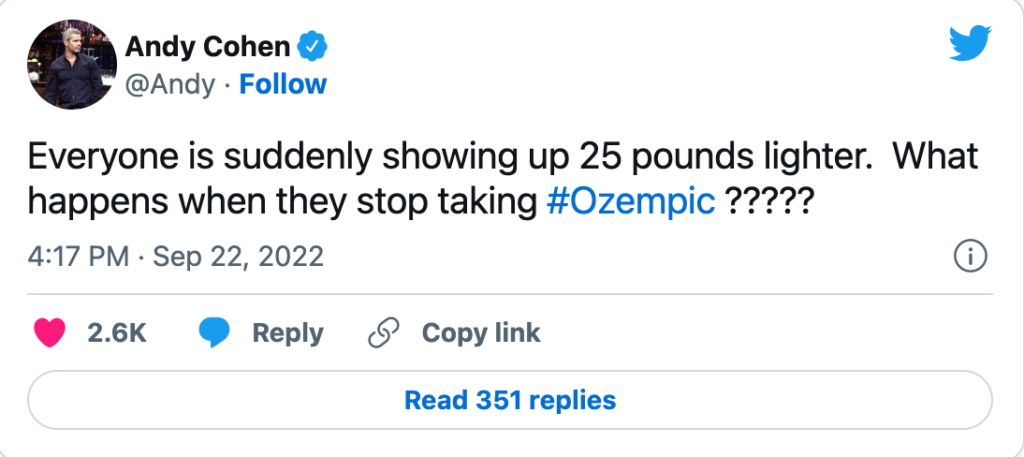Let’s talk about the most talked about family in the world after the Royals; The Kardashians.
Even after working in diabetes management and education for seven years, I am still in awe at what celebrities do for weight loss. As we know, weight loss is a chronic desire in Hollywood – the thinner, the better. The “nothing tastes as good as skinny feels” slogans or “flat tummy tea discount codes” that are so casually tossed around just don’t make sense. There never seems to be a focus on actual health or nourishment, it’s all just a quick fix.

And this is why it’s so hard for me to understand why individuals are still so spellbound by the latest and greatest celebrity fad diet. Why would you ever want to align with the health standards of a celebrity? Look good, feel bad, bandaid it with thousands of medications, surgeries, and interventions from an endless wallet.
This is a big reason why I encourage my patients to partake in Unfollow Friday, to avoid seeing unrealistic, unattainable and just downright unhealthy behaviors on social media. Please note, TikTok has become a dangerous place for misinformed diet and nutrition advice. Always discuss medication, diets and anything else related to your health with a medical professional.

And while I can go on and on about unrealistic and unhealthy behaviors seen on social media, I’m here to review the current weight loss craze. So, let’s talk about rise in the use of semaglutide injections like Ozempic, Trulicity, Mountjaro, and Wegovy for weight loss. And yes, this is what the Kardashians and many other celebrities and influences do.
Let’s dive into this!
Ozempic/Wegovy
What it is:
- Also known as semaglutide, these are GLP-1 Receptor agonists which mimic a natural hormone that the body releases when you eat food
- Semaglutide is a hormone-based medication that mimics a hormone called glucagon-like peptide-1 (GLP-1). The gut secretes this hormone and targets receptors throughout the body, including the brain. When a person is eating, GLP-1 sends the brain the “I’m full” signal. Yes; your body naturally makes GLP-1 to signal satiety in your body!
- Semaglutide decreases gastric emptying, the process by which stomach contents move into the first part of the small intestine as part of the digestive process.
Note: this drug and class of medications are not new! The GLP-1 analogue medications have been used for over 15 years to treat type 2 diabetes (semaglutide was FDA-approved in 2017 for diabetes). Individuals with type 2 diabetes secrete less GLP-1 in response to eating compared to those who do not have the condition. Worth noting, experts believe that’s also the case for people with obesity.
Who is this for?
- It is meant to be used for type 2 diabetes management
- Off-label use for long term weight loss’
- Wegovy (semaglutide) was approved for use for weight loss by the FDA in June 2021
- The drug is for chronic weight management in patients with a body mass index (BMI) of 27 kg/m2 or greater who have at least one weight-related ailment or in patients with a BMI of 30 kg/m2 or greater.
How it helps you lose weight:
- Doctors believe GLP-1’s help to curb hunger.
- Slows digestion, therefore, making you feel fuller for longer, leading you to eat fewer calories
- Because the GLP-1 Receptor agonists stimulate the GLP-1’s even when you’re not eating, as a response, you feel less hungry
- Acts in the areas of the brain involved in the regulation of appetite and caloric intake.
- Research results: A clinical trial, published in The New England Journal of Medicine, showed that—in addition to the 12.5% mean weight reduction above the placebo group (which included lifestyle interventions only)—more than a third of the participants lost 20% of their weight.
Repercussions & Side effects:
- There is now a shortage of drug for those with type 2 diabetes because of this off-label use for weight loss being abused and overprescribed.
- Strong Side effects: nausea, vomiting, pancreatitis, and kidney failure
- The most common side effects of Wegovy include nausea, diarrhea, vomiting, constipation, abdominal (stomach) pain, headache, fatigue, dyspepsia (indigestion), dizziness, abdominal distension, eructation (belching), hypoglycemia (low blood sugar) in patients with type 2 diabetes, flatulence (gas buildup), gastroenteritis (an intestinal infection) and gastroesophageal reflux disease (a type of digestive disorder).
- It’s a weekly injectable you do at home, making it a time and cost commitment.
- Lack of safety: As a matter of fact, there hasn’t been any established safety measures set for when these drugs are used for weight loss. Especially in combination with other products intended for weight loss have not been established.
- Variable Pricing and not affordable. Clearly if you’re the Kardashian’s making millions of dollars a day promoting weight loss supplements and waist trainers, maybe it seems affordable.
Let’s look at the breakdown of cost per injection.
-
- GLP1 medications can cost hundreds of dollars and off-label weight loss usage are not covered by insurance.
- Ozempic:
- Solution Pen-injector (Ozempic (0.25 or 0.5 MG/DOSE) Subcutaneous)
- 2 mg/1.5 mL (per mL): $713.65
- Solution Pen-injector (Ozempic (1 MG/DOSE) Subcutaneous)
- 4 mg/3 mL (per mL): $356.82
- Solution Pen-injector (Ozempic (2 MG/DOSE) Subcutaneous)
- 8 mg/3 mL (per mL): $356.82
- Solution Pen-injector (Ozempic (0.25 or 0.5 MG/DOSE) Subcutaneous)
- Ozempic:
- GLP1 medications can cost hundreds of dollars and off-label weight loss usage are not covered by insurance.
-
-
- Wegovy:
- Solution Auto-injector (Wegovy Subcutaneous)
- 0.25 mg/0.5 mL (per 0.5 mL): $404.71
- 0.5 mg/0.5 mL (per 0.5 mL): $404.71
- 1 mg/0.5 mL (per 0.5 mL): $404.71
- 1.7 mg/0.75 mL (per 0.75 mL): $404.71
- 2.4 mg/0.75 mL (per 0.75 mL): $404.71
- Solution Auto-injector (Wegovy Subcutaneous)
- Wegovy:
-
What does this all mean? A person would need to be on these drugs indefinitely if used for weight loss, otherwise you could potentially gain all the weight back and it would be null and void.
Summary:
In conclusion, my clinical opinion is that GLP-1 drug therapy can be an effective tool for individuals with type 2 diabetes looking to come off of their insulin therapy but without sustainable lifestyle changes paired with their medication usage, the vicious circle of medication reliance ensues. This is the new ephedra; a surge of excitement for those looking for weight loss without other confounding diseases, to use as a quick fix. And what do we know about quick fixes, especially ones with heavy side effects, like this? These drugs don’t provide long-term sustainable health. Therefore, unfollow the Kardashians and pursue REAL health. If your doctor is lazy enough to offer this as a quick-fix weight loss tool for you, pursue a doctor who wants to supports you in determining the root cause of the weight gain.
Want to address weight loss in a healthy, long-term goal-oriented way? Schedule a discovery call to work with a Registered Dietitian like me to discuss healthy habits that won’t just be a quick fix and will leave you feeling like your healthiest self.
Resources:
- Today Show article: https://www.today.com/health/diet-fitness/ozempic-weight-loss-rcna52736
- Mayo Clinic Article: https://www.mayoclinic.org/diseases-conditions/type-2-diabetes/expert-answers/byetta/faq-20057955
- FDA Article: https://www.fda.gov/news-events/press-announcements/fda-approves-new-drug-treatment-chronic-weight-management-first-2014
- UptoDate https://www.uptodate.com/contents/semaglutide-drug-information?search=ozempic&source=panel_search_result&selectedTitle=1~25&usage_type=panel&kp_tab=drug_general&display_rank=1#F51083822
- JAMA https://jamanetwork.com/journals/jamanetworkopen/fullarticle/2796491
- Glamour Magazine https://www.glamour.com/story/ozempic-shortage-diabetes-tiktok-weight-loss



